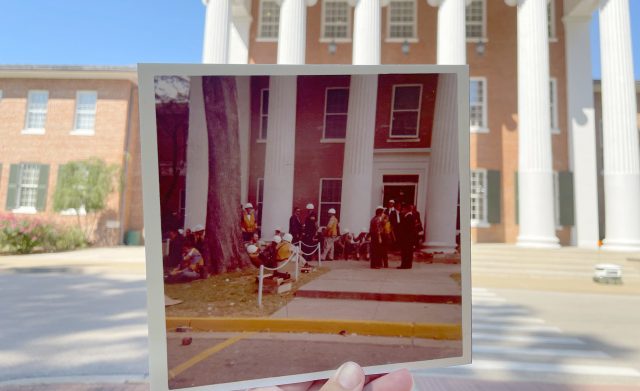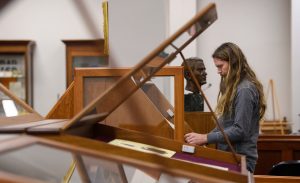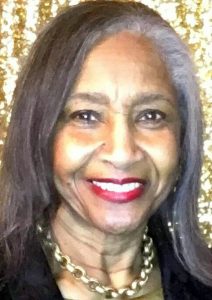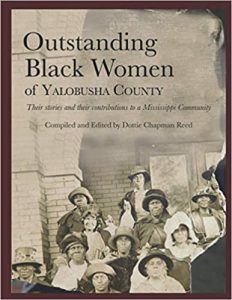
An archival image from the ‘Paving the Path: James Meredith and the Integration of the University of Mississippi’ exhibit provides a glimpse into the past as the university prepares to commemorate the 60th anniversary of Meredith’s enrollment. Photo by Ryan Whittington/UM Marketing and Communications, archival image courtesy Department of Archives and Special Collections
OXFORD, Miss. – The University of Mississippi Libraries‘ Department of Archives and Special Collections is commemorating the university’s 1962 integration with two lectures and an ongoing exhibit.
The lectures offer a one-of-a-kind historical perspective and new digital scholarship exploring the response to the integration.
From the Depths of the Archives
The materials lining the Department of Archives and Special Collections‘ display cases bring to life the story of the university’s turbulent integration: Empty tear gas canisters. Military passes. Edits scrawled on a reporter’s telegraphed manuscript.
The exhibit, “Paving the Path: James Meredith and the Integration of the University of Mississippi,” displays documents, photographs and artifacts from the UM Libraries collections.
“When people see primary source documents, there’s an ‘aha’ moment,” said Greg Johnson, head of special collections, blues curator and professor. “When we see a tangible example of something from the past, we see it more concretely than we might if we had only read about it, allowing us to get closer to feeling the full weight.”
The exhibit is a collaborative effort and includes cases curated by Johnson; Jennifer Ford, senior curator of manuscripts and professor; Leigh McWhite, political papers archivist; Danielle Townsend, special collections librarian (audiovisual); and Lauren Rogers, library specialist. Each display case has a unique theme.
One case is dedicated to James Meredith, his early life, the experiences he encountered leading up to his enrollment. Another case centers on UM’s previous commemorative activities, examining how the university has changed over the years. Yet another explores professors’ responses to the integration, including vocal supporter James Silver, a historian and author of “Mississippi: The Closed Society.”
The materials draw from the University Libraries’ extensive collection of artifacts, documents and images related to the integration, a portion of which can be accessed in the eGrove: Integration of the University of Mississippi collection.

Greg Johnson, head of special collections, blues curator and professor at the UM Libraries, works on an exhibit case in the Department of Archives and Special Collections. Photo by Thomas Graning/Ole Miss Digital Imaging Services
The thousands of rare documents included among the library’s integration-related collections include telegrams, correspondence and letters from individuals such as President John F. Kennedy, Josephine Baker, Malcolm X and others; underground student newspapers; and photos taken on campus during the integration and riot.
“Paving the Path” opened Sept. 19 and will remain open through March 2023. It is housed in the Seymour Lawrence Room on the third floor of the J.D. Williams Library, within the Department of Archives and Special Collections.
The exhibit is open from 8 a.m. to 5 p.m. Mondays through Fridays, except on university holidays.
The full list of case displays features:
- The University of Mississippi Students and the Battle of Oxford
- The University of Mississippi Faculty and Integration
- Context of K-12 Education in Mississippi
- Journalists on the Scene
- S. Marshals, Police and Military Roles in the Riot and Aftermath
- University of Mississippi Post 1962
- James Meredith’s Autobiographical Impulse
- A Civil Rights Legacy
A New Way to Map History
Two librarian scholars will present their research during a presentation at noon Tuesday (Sept. 27) in the Faulkner Room of the J.D. Williams Library. “Dear Mr. Meredith: Mapping Letters Supporting and Dissenting James Meredith’s Integration of UM” demonstrates how digital scholarship can enhance the interpretation of historical events.
Abbie Norris, assistant professor and digital initiatives librarian, and Adam Clemons, assistant professor and digital humanities and data visualization librarian, pursued the project to better understand the national response to the university’s integration.
For their research, Norris and Clemons studied archival letters sent to Meredith that included return addresses within the United States. The letters had previously been classified as pro- and anti-integration. Norris and Clemons then digitally mapped the addresses according to the “pro” or “anti” sentiment.
They were interested in studying whether the findings might challenge preconceived notions about perspectives toward integration in different geographical areas.
“Racism is not only a Southern problem,” Norris said. “It’s an entire United States of America problem. There are anti-integration letters coming from places like California and elsewhere. We hoped that this mapping project would add some complexity and nuance to a complicated issue.”
The project’s future direction may include mapping more letters, transcribing them or implementing a sentiment analysis that will convey the spectrum of responses.
“Our hope with this project is that it will be accessible and reach a wider audience, allowing people to interact with it and play with it,” Clemons said. “Our project was born out of a desire to create a digital humanities project that showcases what the library can offer the university and the scholarly community.
“This is an example of digital scholarship and an incredible collection.”
A Legendary Alumna
Dottie Chapman Reed (BA 74), the first African American admissions counselor at the university, will present a lecture on Thursday (Sept. 29). “Coming Full Circle: My Journey through the University of Mississippi, to Many Points Beyond and Back” will focus on Chapman Reed’s life story and her efforts in oral history preservation.
Her lecture is set for noon on the third floor of the J.D. Williams Library in the Department of Archives and Special Collections. The Center for the Study of Southern Culture is co-hosting the event.
Chapman Reed, who lives in Atlanta, will discuss her childhood in Water Valley, her time as an Ole Miss student in the early years following integration and her career.
She recently donated a collection of personal materials and scrapbooks to Archives and Special Collections. The collection spans her time as an undergraduate and her lengthy and accomplished career in corporate America. Chapman Reed donated the materials with the hope that the contribution will help the university continue to build community.
“The university has made progress in several areas, with much more work to do as a flagship university,” she said. “I believe, as others have said, that it has an obligation to lead Mississippi, the South and the nation. As a leader, it needs to stand up and face a difficult past, and ultimately, it can.
“The university needs to reach out and embrace the broader surrounding communities, especially communities like the one I come from, Water Valley.”
Chapman Reed is collaborating with the Center for the Study of Southern Culture on an oral history project called “Black Families of Yalobusha County.” The effort stems from a newspaper column she authored in the North Mississippi Herald.
“We are very excited to have Mrs. Chapman Reed with us,” Johnson said. “All of the work she has done documenting the lives of African American families in Yalobusha County is incredibly important, as is her experience working at the university not long after the integration.
“Special Collections is also greatly indebted to Mrs. Chapman Reed for the donation of her significant archival collection.”

